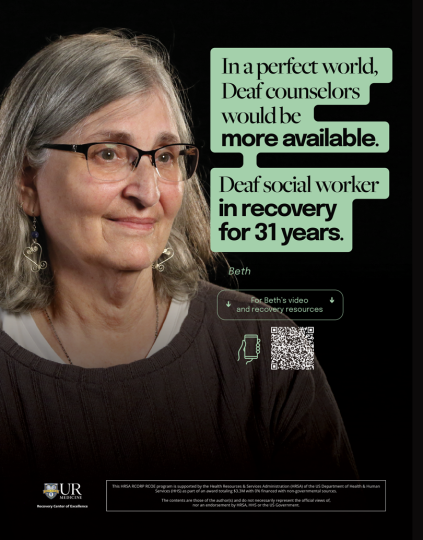- [Interpreter]
My name is Beth M. I am in recovery and have been for 31 years, really more than that. I was a drinker during my college days and also partied with marijuana and a few other drugs. Things took a turn for the worst for me after living that life for a while.
First, I joined Al-Anon because of my husband. Later, I joined other 12-step programs related to my food addiction. And then I learned that I was actually also an alcoholic. So I attended a variety of support groups to work on the spiritual aspect of my recovery through the years.
I also have a degree in social work and have worked as a counselor, both for alcohol and drug addiction, for two years as well as many years of mental health counseling. Here are some of my preferred signs for different terms, different words that I tend to use. Really, it depends on the context, where I am, and who I'm talking to. For example, I might be discussing food addiction or overeating.
This is my sign for alcoholic. I've seen some people use this sign for alcoholic, but it's not what I would use. Sober, I would sign like this, clean and sober. Sometimes I use an older sign for drugs like this, drugs.
Now I know that the more commonly accepted sign is this. How have stigmas influenced or impacted me? Years ago when I was growing up, you didn't really see alcohol use in my family. It was kind of looked down upon or judged.
If I were to have that problem, it would be an issue. So as a result, I was always in denial that it was ever an issue for me. Also, in the Deaf community, there is a tendency to quickly label or judge someone for their behavior. So when a person has any sort of, quote, unquote, "Problem," it's hard to talk about because it will quickly make waves in the community and become fodder for judgment.
So it was a relief to have found a small community of folks with shared experiences who are comfortable keeping our conversations confidential. Through that community, we're able to help each other get sober successfully. From my past experience, I have some advice for medical professionals. I encourage you to have an interpreter in place if you yourself do not know sign language.
It's also nice to have a CDI, or a Certified Deaf Interpreter. Try not to restrain the wrists of a Deaf individual. I remember hearing of a story where a Deaf person was flailing around quite a bit, and as a result, they were restrained at the wrists. It's essentially the same thing as covering the mouth or throat of a hearing person, they're unable to communicate.
In terms of barriers faced by Deaf individuals, specifically those who use sign language. Well, there's a chance that some of these people who use are unaware about services that could be available to them. And as a result, they might miss out on quite a bit. And by that I mean counseling, or programs, or other services.
The barriers exist because it costs a lot to provide sign language interpreters. I specifically remember one place that was resistant to having a Deaf person in treatment because it cost too much to provide interpreting services. Before Covid, many Deaf individuals around the United States didn't know about any of these services. But during Covid, many places shifted to Zoom and started offering services remotely.
As a result, more Deaf people were able to find services. They were able to participate via Zoom and be more involved with the independent programs being offered. How do individuals who are living in more remote rural areas find recovery services? That's a good question.
I know of a few when I worked for the Department of Mental Health. I remember there was one person who lived quite far, and that area where they lived didn't have reliable internet. I mean, back then they didn't have remote video opportunities anyway so that person was apparently just stuck, really isolated. How can you successfully achieve recovery?
Oh, just keep showing up. Whether that's attending support groups or anonymous groups. Find a counselor who can maybe understand how you can continue working on yourself. It's not easy to get clean and sober.
It doesn't happen in one day. It takes a long time to gain the fortitude, to get healthy, to be grateful, to be clean and sober. In a perfect world, what do I envision for Deaf patients with alcohol and drug addictions? It would be nice to have Deaf counselors and therapists available to support them, to be able to provide more education and information to these patients because often they don't know what to do.
They might have minimal knowledge, but to have someone help them dig deeper and give them the information they need because they're missing out on the resources that are out there for them.
Beth has been in recovery for 31 years. She says, "It doesn't happen in one day. It takes a long time to gain the fortitude, to get healthy, to be grateful, to be clean and sober."
